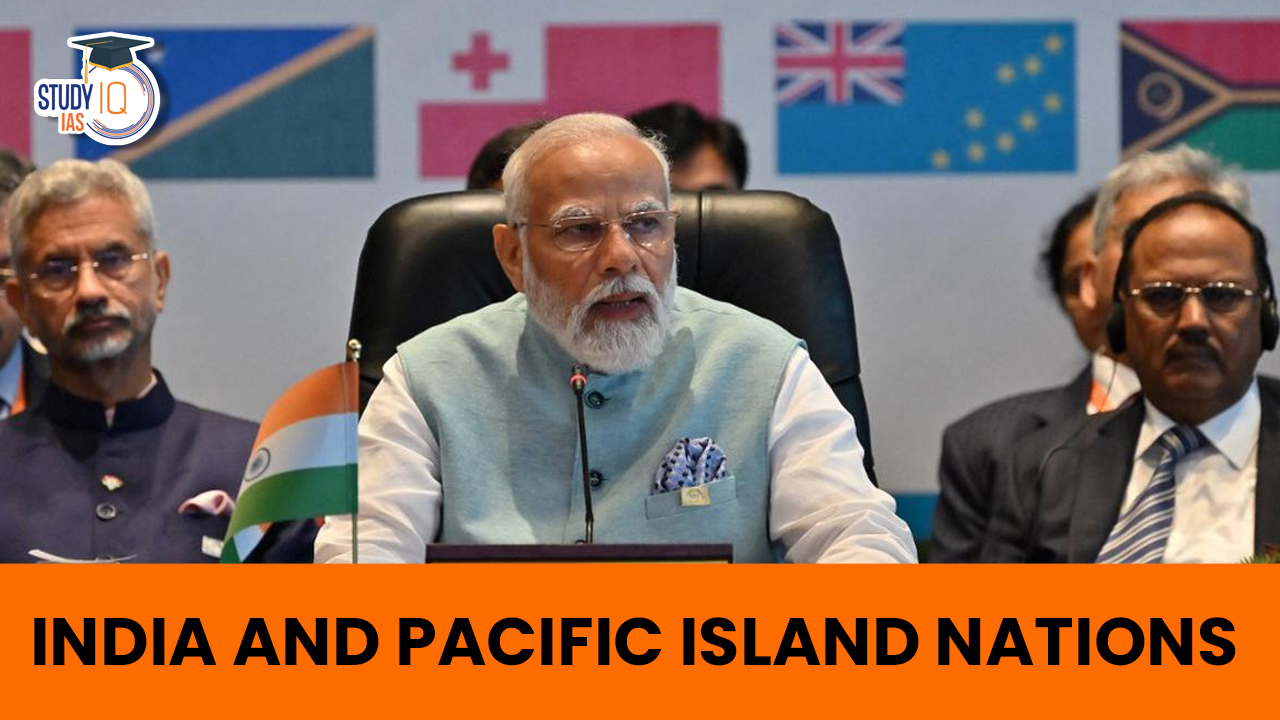Table of Contents
Context: Prime Minister Narendra Modi unveiled a 12-point development agenda for the Pacific Island Nations at the 3rd FIPIC (Forum for India-Pacific Islands Cooperation) summit held at Port Moresby, the capital of Papua New Guinea.
About the 3rd FIPIC (Forum for India-Pacific Islands Cooperation) summit
- The summit was co-chaired by India along with Papua New Guinea.
- All the 14 Pacific Island countries participated in the summit.
- At the Summit, PM Modi asserted that the Pacific island nations are “large ocean countries and not small island states”.
- The 12-point development agenda encompassed various areas of cooperation, including commerce, technology, healthcare, and climate change etc.
- About FIPIC:
- FIPIC is a multinational grouping for cooperation between India and the Pacific Islands nations.
- The main objectives of FIPIC include enhancing political dialogue, fostering economic cooperation, promoting trade and investment, and addressing common challenges such as climate change, sustainable development, and disaster management.
- As part of the Act East Policy, India established the FIPIC and its inaugural gathering was convened by Prime Minister Modi in Fiji in 2014.
- In 2015, the second meeting of the forum was held in Jaipur. In this gathering, numerous initiatives were announced to promote the development and well-being of the people.

What are Pacific Island Nations (PINs)?
- The Pacific island states comprise a group of 14 island nations in Pacific Ocean – Cook Islands, Fiji, Kiribati, Marshall Islands, Micronesia, Nauru, Niue, Palau, Papua New Guinea, Samoa, Solomon Islands, Tonga, Tuvalu, and Vanuatu.
- Based on several factors, including geographical proximity, cultural similarities, and linguistic affiliations, PINs are further categorized into three major island groups namely Melanesia, Micronesia, and Polynesia.
- These countries face common challenges such as climate change, sustainable development, limited resources, and vulnerability to natural disasters.
Why are these Pacific Island Nations (PINs) important for India?
- India’s Act East Policy: Engagement with these 14 countries is part of India’s Act East Policy and India has been engaging with these countries mainly through development assistance under South-South Cooperation.
- Strategic Interests: The Pacific region holds strategic importance due to its location and maritime routes. PINs can serve as strategic partners for India in areas such as maritime security, defense cooperation, and maintaining stability in the Indo-Pacific region.
- Economic opportunities: PINs provide economic opportunities for India via trade, investment, and resource exploration. They possess minerals, fisheries, and energy reserves. Strengthening ties with PINs diversifies India’s trade, boosts energy security, and promotes economic growth.
- Counterbalancing influence: India’s increased engagement with PINs aims to promote a multipolar approach, and ensure a rules-based order amidst the growing influence of major powers like China, Japan, the US, and Russia in the Pacific region.
- Addressing common challenges: India’s engagement with PINs tackles common challenges like climate change, natural disasters, sustainable development, and ocean conservation through collaboration, knowledge sharing, and joint initiatives, promoting climate action and resilience-building.

Challenges for India in the Region
- Weak Diplomatic Representation: Indian diplomatic representation is weak and many of the PIF members are covered by non-resident Indian missions which are not able to make frequent visits.
- Countering China’s Influence: Countering China which has a stronghold in the region will be a herculean task. China’s extensive presence in the region, including thousands of Chinese companies operating in various sectors, presents a challenge for India.
- Financial Constraints: Meeting the requirements of multiple development projects in the region poses financial constraints for India.
- Influence of Australia: These countries are highly influenced by Australia due to its close proximity – for example, Australia helping the development of natural gas of Papua New Guinea, etc.
Efforts of India towards the Pacific Island Nations (PINs)
- Development assistance: India has been extending assistance to PINs in the form of capacity building, training, grants-in-aid, loan assistance and community development projects.
- Centres of Information Technology Labs and Centres for Excellence in IT (CEITs) have been established in different countries in PINs.
- India is supporting infrastructure development, and the focus is especially on education, culture, health, colleges, IT infrastructure, and setting up of digital libraries, among others.
- Fiji and PNG were supplied with indelible ink for use in their general elections.
- Climate resilience: Due to the effects of rising sea levels these countries are vulnerable to climate change. And India has once again been at the forefront in extending initiatives including International Solar Alliance (ISA) and Coalition for Disaster Resilient Infrastructure (CDRI).
- HDAR: From time-to-time India has been providing Humanitarian Assistance and Disaster Relief (HADR) and has also provided assistance during the pandemic when it supplied Covid-19 Vaccines and Medical supplies.
- Sustainable development and women empowerment: Challenges of climate change threaten PINs and to deal with this, India has a project for providing solar electrification for 2,800 houses in 14 countries and has also undertaken 70 women solar engineers — Solar Mamas.
- These 70 women have been trained and the process of electrification is underway. This will not only address climate change and achieve the goals of sustainable development; it will also help to provide livelihoods to women.
- In 2017 India-UN Development Partnership Fund was created, aimed to support the demand-driven sustainable development projects not only in developing countries, LDCs and on small island developing states. In fact, PINs have been beneficiaries of this fund.
- Pacific Islands Forum: India has been a dialogue partner to the Pacific Islands Forum.
- The Pacific Islands Forum (PIF), established in 1971, is a regional intergovernmental organization that aims to promote cooperation and dialogue among Pacific Island countries.


 Bihar BPSC 70th Mains Result 2025 Out: C...
Bihar BPSC 70th Mains Result 2025 Out: C...
 Pax Silica Initiative: Meaning, Objectiv...
Pax Silica Initiative: Meaning, Objectiv...
 Tapanuli Orangutan: Habitat, Characteris...
Tapanuli Orangutan: Habitat, Characteris...

























